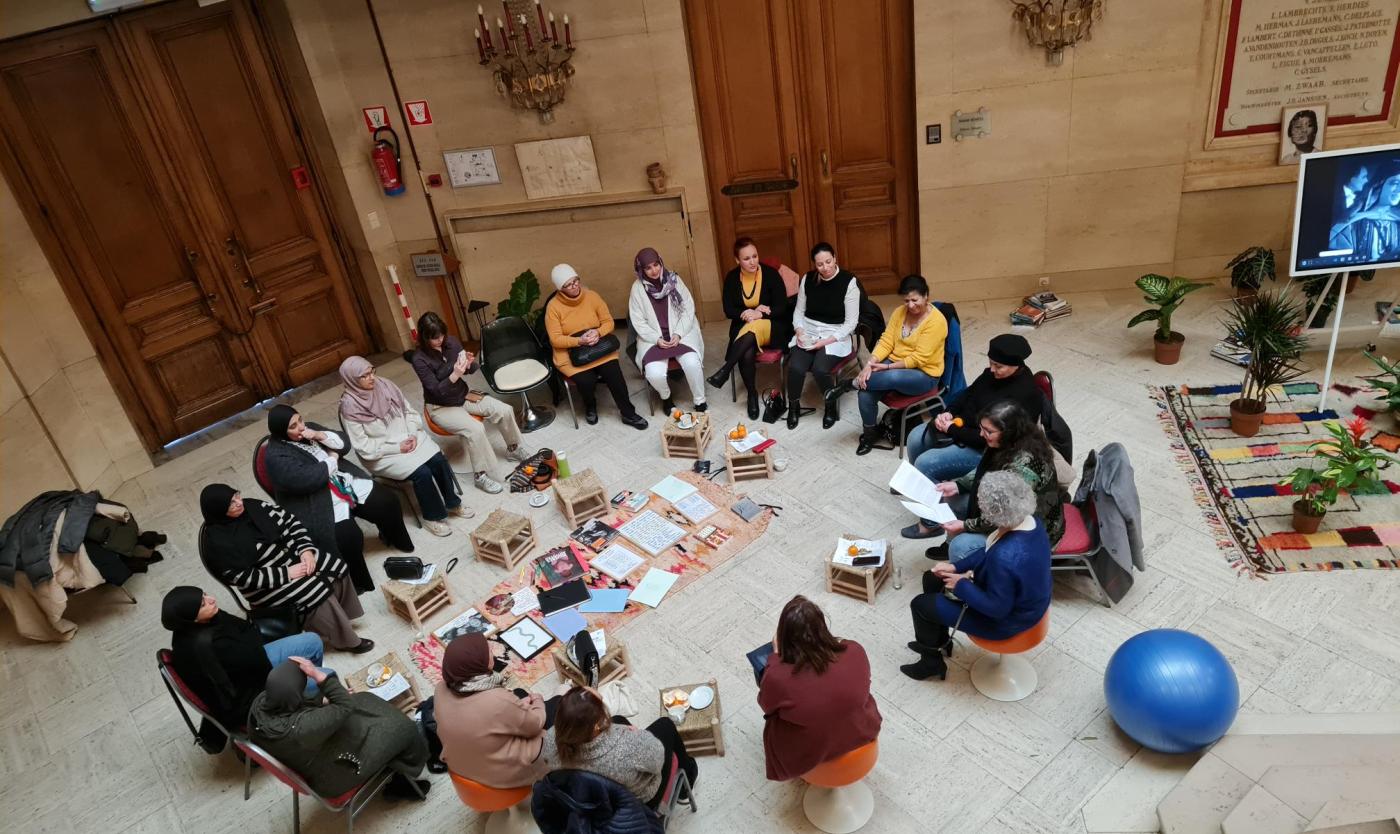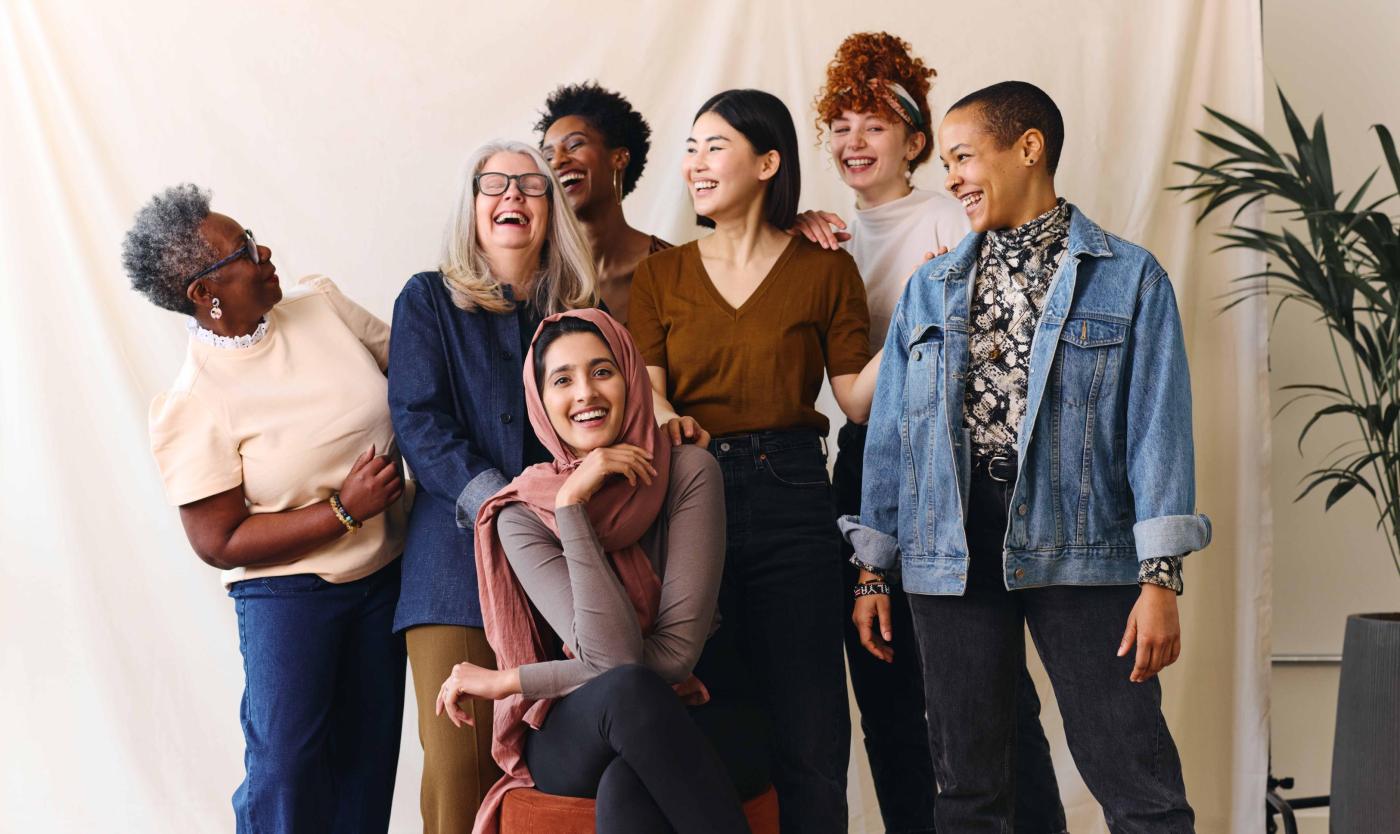
About the chair
The Fatima Mernissi Chair is an initiative of RHEA - Expertise centre for gender, diversity, and intersectionality, in collaboration with Crosstalks. Fatima Mernissi was a prominent Moroccan sociologist who was of great importance in the development of feminism in the Muslim world. She died on 30 November 2015. Her ideas live on in the chair that bears her name.
From the context of the city of Brussels and in line with the values of VUB, Fatima Mernissi's ideas inspire academic and social engagement. More specifically, the work involves interdisciplinary academic research and a socially binding programme of public lectures and workshops on power, gender, and Islam. Since March 2017, the chair has presented a series of lectures with innovative visions and critical voices as a springboard to a constructive society in Brussels. In doing so, the chair creates a framework for an open dialogue with opinion makers, civil society organisations, artists, activists, and young people.
The chair is part of the Faculty of Social Sciences and Solvay Business School.
Behind the Veil: Islam and the battle of the sexes
In 1975, Fatima Mernissi published Behind the Veil: Islam and the battle of the sexes. That book earned her the nickname Simone de Beauvoir of the Maghreb. The Guardian named her one of the 100 most influential Arab women. Her work explores the relationship between power, gender, and Islam. It builds bridges between the West and the Arab world.

Two cornerstones
The Fatima Mernissi Chair has two cornerstones. The first is academically oriented, the second is geared towards society with, amongst other things, an annual series of activities.

Academic cornerstone
Scientific research is set up with 4 focal points:
- The so-called 'Muslim question': in particular the framing of power, gender, and Islam in current scientific and social debate. Special attention is paid to innovative and critical voices.
- Identity and perception of identity among Muslim populations in Europe: with a particular focus on young people. Here we focus on new ideas and practices that are growing within the Muslim populations themselves. These include identity formation and the interpretation of 'masculinity' and 'femininity', of 'feminism' and 'Islam'.
- Possibilities and limitations of the current political structures and cultures of today's liberal democracies in light of the integration of Islam in Europe.
- Brussels and its various dynamics and communities.

For a wide audience to promote society
Within the academic world, many researchers and thinkers are already active on these themes, interpreting Islam in a critical way and examining the role of gender, power, and religion in society's problems. However, this knowledge is not always accessible to a wide audience. Also, the research within the framework of the chair should not remain on the VUB campus. It should play an important role in the promotion of society in a city like Brussels.

Society-oriented cornerstone
We create a framework for a dialogue on the broad topic of power, gender, and Islam between science and society. The chair targets social stakeholders such as opinion makers, civil society organisations, artists, activists, and all kinds of stakeholders.
Mutual exchange of knowledge
Civil society already has various initiatives that critically rethink Islam and look for ways to shape society in a positive way. By creating a platform for social debate, VUB can make an important and constructive contribution to a mutual exchange of knowledge.
Activity series: Academia meets Society
An important catalyst for this knowledge exchange is the annual Academia meets Society activity series. It allows us to create a forum for innovative, critical voices that we offer as raw material for activist, policy-oriented, or artistic activities. Since 2017, chairholder Iman Lechkar has been shaping this series of activities.
Slam the City (2017)
Slam the City used urban energy to create a more inclusive and cohesive Brussels fabric.
The Fatima Mernissi Boekenkaravaan (2018)
The Boekenkaravaan introduced young people in Brussels to an artistic and socially relevant discipline. The project also inspired them by having them enter into a dialogue with different writers, especially Flemish-Moroccan ones.
Forgotten queens: women in power (2019)
This three-part series of activities wanted to zoom in on mechanisms that ensure the survival and reinforcement of the male elite and thereby curtail or make invisible the female potential.
AflamNa (‘Our Films’) (2020)
On the basis of North African films, we created a forum to discuss gender, sexuality, and power in Muslim communities and in society at large.
Lost Stories. A Female Gaze on Migration Histories (2023)
This four-day film festival broke gender stereotypes and cultural taboos with films by female filmmakers from North Africa and Southwest Asia.
Frames of Resistance (2024-...)
With a carefully chosen selection of films varying in genre, theme and cultural context, this series highlights the richness and diversity of Arab cinema and opposes dominant Western narratives and stereotypes about Palestinian life and the wider Arab experience.
Chairholder

Iman Lechkar
Iman has a Master in applied translation English-Spanish-Arabic, a MaNaMa in international relations and diplomacy, and a doctorate in social and cultural anthropology. She combines linguistic and human, cultural, and social science expertise. This expertise enables Iman to analyse and teach social trends from an interdisciplinary perspective. Her involvement is mainly in higher education. She carried out doctoral and postdoctoral research at the KU Leuven and taught at Odisee within the Social Work programme.
Iman examines forms of Islam in the West. She specialises in the anthropology of Islam, multiculturalism, critical theory, gender theory, Islamic studies, and Middle Eastern politics and history. Both in her research and in her teaching, Iman tries to connect different intellectual, social, cultural, and historical traditions.
Finally, she is also involved in civil society in Brussels and Antwerp. There, she tries to help shape the debate on Islam, diversity, and minorities in the Belgian context.
Film portrait about Fatima Mernissi
Film portrait about Fatima Mernissi by Saddie Choua
Commissioned by VUB, visual artist Saddie Choua created an impressive artistic film portrait about Fatima Mernissi especially for the Fatima Mernissi Chair. It bears the title "Je crois qu'il y a confusion chez vous. Vous croyez que moi je veux vous imiter. #FatimaMernissi"